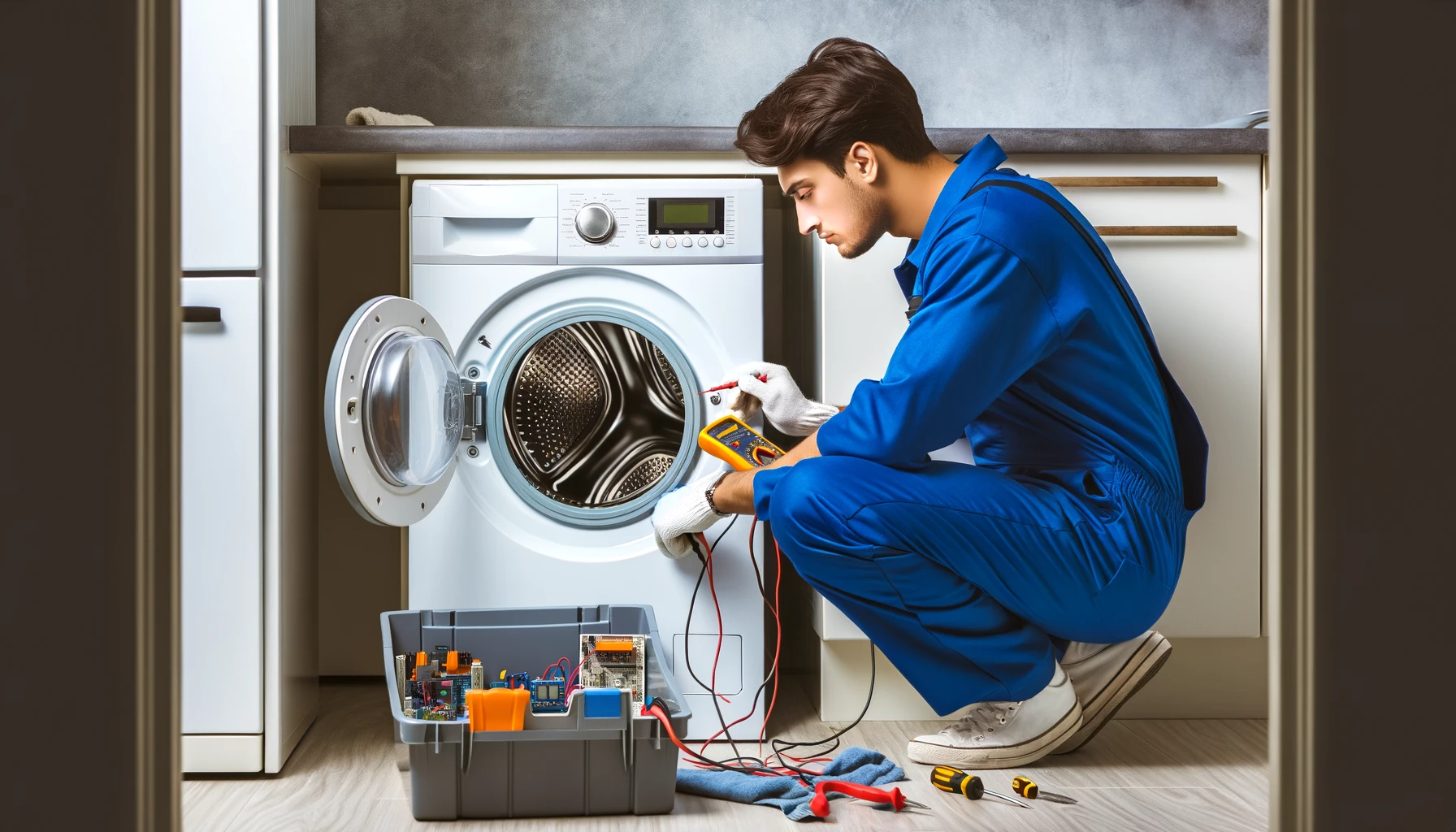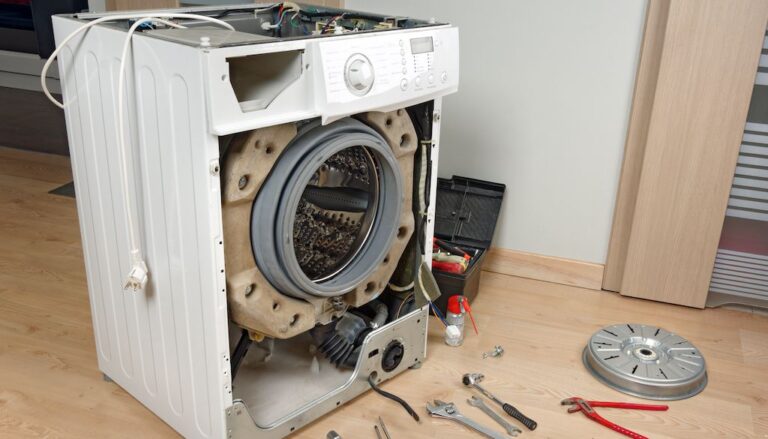Repairing a washing machine can save money. Sometimes, it might not be worth the effort.
This question often puzzles homeowners facing appliance issues. Washing machines are essential in daily life, cleaning clothes with ease. When they break, deciding whether to repair or replace becomes crucial. Costs, age, and frequency of breakdowns all play a role in this decision.
Repairing might seem cheap but can lead to future expenses. New models offer energy efficiency and advanced features. Understanding when a repair is beneficial and when replacing is smarter is key. This guide will help you weigh the pros and cons, giving you clarity on making the best choice for your home and budget.
Repair Costs Vs. Replacement
Repair costs can vary. Small issues might cost less. A new belt or hose is cheap. Complex problems cost more. Fixing a motor is expensive. Always check the age of your machine. Older machines might break again soon. Repairs add up over time.
New machines come with warranties. They use less energy and water. This saves money. Look for brands with good reviews. Check prices at different stores. Some stores offer free delivery. Consider the long-term benefits. New machines last longer. They also have modern features.

Common Washing Machine Issues
Washing machines often face issues like leaks, unusual noises, or failure to spin. Repairing them can be worthwhile if costs are lower than buying new. Consider age and repair frequency before deciding.
Leaking Water
A washing machine may leak water due to a damaged hose. Check the hose for cracks or breaks. Tighten connections to stop leaks. Another reason could be a faulty door seal. Inspect the seal for wear or dirt. Clean and replace it if needed. Regular maintenance helps prevent leaks. Inspect and clean your machine often to avoid problems.
Noisy Operation
A noisy washing machine can be annoying. Check for loose parts inside the machine. Tighten any loose screws or bolts. Balance the load properly to reduce noise. Uneven loads can cause loud sounds. Inspect the drum for foreign objects. Coins or buttons may cause rattling. Remove items to stop the noise. Regular checks keep your machine quiet and smooth.
Signs You Should Repair
Small issues like scratches or small dents can be fixed. These do not affect how the machine works. A broken knob or loose door is easy to fix. These are minor and often cheap repairs. Fixing them can make your machine look new. It also keeps it working well. Minor repairs are usually not costly. They help the machine last longer.
Bought the washing machine recently? Consider repairing it. It might still be under warranty. Warranty means you pay less or nothing for repairs. Newer machines often have parts available. This makes fixing them easier and faster. It is better to repair than buy a new one. A quick fix can save money and time. Always check if the warranty covers the damage.
When Replacement Makes Sense
Deciding whether to repair or replace a washing machine depends on several factors. Consider the age and condition of the appliance. Sometimes, repair costs can be nearly as high as buying new. If the machine frequently breaks down, replacement might save more money in the long run.
Old Age
A washing machine older than 10 years often faces issues. Parts become worn and hard to find. Costs rise as old parts need replacement. New machines are more efficient and save energy. They use less water, reducing bills. Consider a new model if your machine is old.
High Repair Frequency
If repairs happen every few months, think about replacing the machine. Constant breakdowns mean higher repair costs. A new machine might be cheaper in the long run. New machines come with warranties. These warranties cover repairs for a few years. Frequent repairs signal the end of a machine’s life.
Diy Repairs
Some washing machine problems are easy to fix. A common issue is a blocked hose. Check if the hose is bent or clogged. Straighten it or remove debris if needed. Another easy fix is a loose door. Tighten screws to secure it. If water is not draining, clean the drain filter. A clogged filter can stop water from leaving the machine. These simple repairs can save money and time.
Safety is very important during repairs. First, unplug the machine. This stops any chance of electric shock. Wear gloves to protect your hands. Keep tools away from children. Use the right tools for each task. Read the machine manual for guidance. Always be careful and stay safe while fixing your washing machine.

Professional Repair Services
Choosing the right technician is very important. A good technician knows how to fix your washing machine well. Always check their experience and skills. Read reviews from other customers. Make sure they have proper certifications. This ensures they know what they are doing. A skilled technician can save you money in the long run. They can fix the problem without causing more damage. Also, ask if they offer a warranty on their work. A warranty means they will fix any mistakes without extra charge. This gives you peace of mind.
Repair costs can vary a lot. Simple repairs are usually cheaper. Complex issues may cost more. Always ask for a price estimate before work begins. This helps avoid surprises later. Some technicians charge by the hour. Others may have a flat fee. Ask if the price includes parts and labor. Sometimes, parts can be very expensive. Knowing this helps you plan your budget better. It’s smart to compare prices from different technicians. This way, you find the best deal without breaking the bank.
Environmental Impact
Fixing a washing machine helps the planet. It stops old machines from going to the dump. Throwing away machines makes a lot of waste. Repairing them can help reduce waste. Fixing things is better for the earth than buying new ones. Less waste means a cleaner world for all of us.
Old machines can use more energy. Fixed machines may run better and use less power. This saves energy and is good for the earth. New parts can make machines work like new. Saving energy also saves money on bills. An efficient machine is better for nature and your home.
Long-term Maintenance Tips
Cleaning your washing machine helps it last longer. Wipe the outside often. Check the detergent drawer for mold. Run an empty wash with vinegar once a month. This removes bad smells. Clean the drum with a damp cloth. Also, clean the filter regularly. It catches dirt and hair. Dirty filters make the machine work harder.
Do not overload the washer. Too many clothes can damage it. Use the right detergent amount. Too much soap is bad. Choose the correct wash setting. This saves energy and protects clothes. Avoid slamming the door. Gently close it every time. Keep the washer level on the floor. An uneven machine shakes a lot. This can cause harm.
Frequently Asked Questions
Is It Worth Paying To Fix A Washing Machine?
Repairing a washing machine can be worthwhile if the cost is less than half of a new one. Consider the machine’s age and repair history. Frequent repairs may indicate it’s better to invest in a new model. Evaluate energy efficiency and potential savings with a newer machine.
What Is The Life Expectancy Of A Washing Machine?
A washing machine typically lasts 10 to 13 years. Regular maintenance can extend its lifespan. Choose a reliable brand and model for better longevity. Proper usage and timely repairs also contribute to its durability. Always follow the manufacturer’s guidelines to maximize the machine’s life expectancy.
What Usually Fails On A Washing Machine?
Common washing machine failures include worn-out belts, faulty motors, blocked drain pumps, and broken door locks. Electrical issues like damaged wiring or control board malfunctions can also occur. Regular maintenance helps prevent these problems. Keep an eye on unusual noises or leaks to catch potential issues early.
Is It Worth Getting A 5 Year Old Washing Machine Fixed?
Fixing a 5-year-old washing machine can be cost-effective if repair costs are reasonable. Compare repair costs with buying a new one. Consider the machine’s condition and past issues. Machines typically last 10-15 years, so repairs might extend its life. Consult a professional for an accurate assessment.
Conclusion
Deciding to repair a washing machine can be tricky. Costs and age matter. Newer machines may be worth fixing. Older models might need replacement. Consider repair costs versus buying new. Think about energy efficiency too. Repairs can be a temporary fix.
New machines often save more money in the long run. Weigh the pros and cons carefully. Consult a professional for advice. Make the best choice for your needs. Remember, a well-informed decision saves time and money. Your washing machine’s future depends on thoughtful consideration.
Choose wisely for peace of mind.
